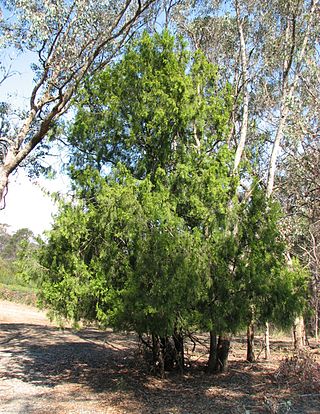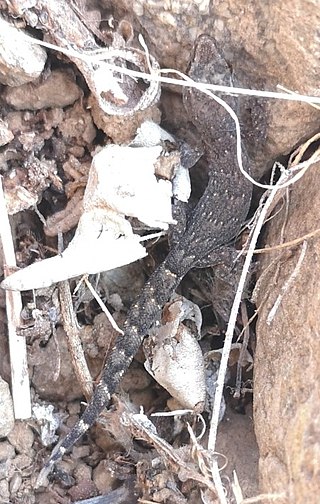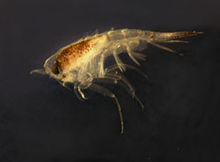
In Greek mythology, Athamas was a Boeotian king.
In Greek mythology, Themisto was a Thessalin princess as the daughter of King Hypseus of Lapiths and the naiad Chlidanope. Her name is derived from the Ancient Greek word: "θεμιστος" which means "belonging to the law", or "belonging to the customs".

The diving petrels form a genus, Pelecanoides, of seabirds in the family Procellariidae. There are four very similar species of diving petrels, distinguished only by small differences in the coloration of their plumage, habitat, and bill construction. They are only found in the southern hemisphere. The diving petrels were formerly placed in their own family, the Pelecanoididae.

Ecpleopus is a genus of lizard in the family Gymnophthalmidae. The genus contains only one species, Ecpleopus gaudichaudii, which is endemic to Brazil.

Themisto, also known as Jupiter XVIII, is a small prograde irregular satellite of Jupiter. It was discovered in 1975, subsequently lost, and rediscovered in 2000.

Charles Gaudichaud-Beaupré was a French botanist.

The Hyperiidea are a suborder of amphipods, small aquatic crustaceans. Unlike the other suborders of Amphipoda, hyperiids are exclusively marine and do not occur in fresh water. Hyperiids are distinguished by their large eyes and planktonic habitat. Most species of hyperiids are parasites or predators of salps and jellyfish in the plankton, although Themisto gaudichaudii and a few relatives are free-swimming predators of copepods and other small planktonic animals.

Thyrsites atun, known as the snoek in South Africa and as the barracouta in Australasia, is a long, thin species of snake mackerel found in the seas of the Southern Hemisphere, and a popular food fish in South Africa, particularly along the west and southwest coast. Despite its Australasian name, it is not closely related to the barracuda.

Exocarpos is a genus of flowering shrubs and small trees in the sandalwood family, Santalaceae. They are found throughout Southeast Asia, Australia and the Pacific Islands.

Ceratopteris is the only genus among homosporous ferns that is exclusively aquatic. It is pan-tropical and classified in the Parkerioideae subfamily of the family Pteridaceae.

Bobea is a genus of flowering plants in the family Rubiaceae. All species in this genus are endemic to Hawaii. Bobea was named for Jean-Baptiste Bobe-Moreau by Charles Gaudichaud-Beaupré in 1830 in his book Voyage de l'Uranie.

Grevillea × gaudichaudii is a hybrid species of flowering plant in the family Proteaceae and is endemic to a restricted area of New South Wales. It is a prostrate shrub with deeply lobed leaves and toothbrush-like groups of dark pink to burgundy-red flowers. The plant is a popular garden ground-cover.

Senna gaudichaudii, also known by many common names, including kolomana in Hawaii and as blunt-leaved senna in Australia, is a species of flowering plant in the family Fabaceae and is native to some Pacific Islands including Hawaii, parts of Southeast Asia and Queensland in Australia. It is shrub or small tree with pinnate leaves, usually with three to five pairs of oblong to egg-shaped leaflets, and yellow flowers arranged in groups of four to ten, with ten fertile stamens in each flower.

Ocypode gaudichaudii, also known as the painted ghost crab or cart driver crab, is a species of crab found on Pacific beaches from El Salvador to Chile as well as on the Galápagos Islands. The species was first described by Henri Milne-Edwards and Hippolyte Lucas in 1843.

The Chilean marked gecko is a species of lizard in the family Phyllodactylidae. The species is endemic to Chile, in the Chilean matorral ecoregion. There are three recognized subspecies.
The Ganymedidae are a family of parasites in the phylum Apicomplexa.

Themisto is a genus of marine amphipods in the family Hyperiidae. Their distribution is cosmopolitan.

Amyema gaudichaudii, commonly known as melaleuca mistletoe, is a plant in the family Loranthaceae endemic to eastern Australia. Like other mistletoes, it is a shrubby, woody, aerial hemiparasite plant. It has relatively small, wedge-shaped leaves and small, dark red flowers arranged in groups of three. It only grows on a few species of Melaleuca.

Garthia is a genus of lizards, commonly known as marked geckos, in the family Phyllodactylidae. The genus is endemic to Chile.
















